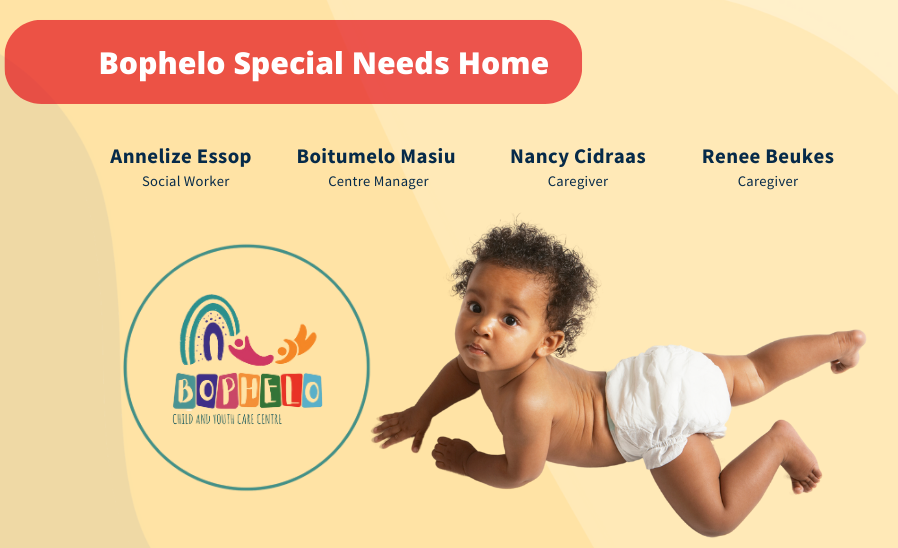
Working in a Baby Home: From the Heart of a Social Worker
6 January 2025
AN OPPORTUNITY FOR SUPPORT, INVOLVEMENT & DONATIONS
29 April 2025
Working in a Baby Home: From the Heart of a Social Worker
6 January 2025
AN OPPORTUNITY FOR SUPPORT, INVOLVEMENT & DONATIONS
29 April 2025
Working at Bophelo: From the Heart of a Social Worker
Annelize Essop – Social Worker (Bophelo Special Needs Home)
SAFETY, LOVE, AND OPPORTUNITIES DESPITE LIFE’S ADVERSITIES
The Special Needs House at Bophelo Child and Youth Care Centre is one of two AFM Welfare Special Needs Homes, alongside Villa Lethemba in Kempton Park. Established in 2006, it is located in Beaconsfield, Kimberley, and provides care for 10 children with disabilities who have been abandoned, orphaned, neglected, or are living with HIV. Many are facing medical conditions such as congenital rubella syndrome (CRS), cerebral palsy, and fetal alcohol syndrome (FAS), which impact their physical and intellectual development.
One of our children, who has cerebral palsy and kidney complications, was selected to represent his school in Boccia at the 2025 Toyota SASAPD National Championships in Gqeberha this March. Despite only starting with sport last year, his remarkable progress earned him a spot at nationals. His story is a testament to resilience and the rewards of dedication.
At Bophelo, every achievement is celebrated - whether it’s tying a shoelace or buttoning a shirt. High fives and hugs are a big part of our home because sometimes, this is how we express feelings we can’t put into words. We might get a little shy when you make a big fuss over us, but in return, you’ll get a big smile, a quiet giggle, or a soft ‘thank you.’ Sometimes, we can be a handful - getting under your feet in our eagerness to help - but please be patient with us. We’re just trying to do our best.
Being a social worker at a Special Needs House requires authenticity, patience, and creativity. This role has taught me to see each child as an individual - while two children may have the same disability, they are not necessarily alike. In Kimberley and surrounding areas, the demand for Special Needs Houses remains high, as the city's only other centre struggles to keep up, based on frequent enquiries from the community and social workers.

A Day in the Life of a Special Needs Home. A typical day at the Special Needs House starts at 5h00. The children wake up cheerful, still yawning but excited for school. Breakfast is served at 6h15, followed by medication at 6h30. A strong sibling bond exists among them, with older children helping the younger ones get ready and board their transport at 7h00.
For those staying home, the day begins at 7h30 with morning exercises at 8h00, followed by breakfast, medication, and getting dressed. They greet staff with warm hugs and bright smiles before engaging in activities like puzzles, painting, and clay modelling. Lunch is at 11h30, followed by a walk or story time. When the schoolchildren return, they have lunch, complete homework or activities, and enjoy a snack at 15h30 before free play and bath time. Dinner is at 18h00, with evening prayers at 19h00. Before bed, each child shares a heartfelt hug with the Centre Manager and says goodnight to all the other children.
The Emotional and Psychological Care of Children. The caregivers at the Special Needs Home are truly special - loving, passionate, and patient. They care for the children as their own and are deeply protective of them. For some, these caregivers are the only mother figures they know, forming strong bonds of attachment. Through my experience with these children, I’ve learned that a warm hug and kind words can work wonders in bringing comfort and calm.
The Centre Manager follows a dietitian-approved menu to prepare nutritious meals for the children. Their health is closely monitored in partnership with doctors from the PAEDS ( Paediatric Active Enhanced Disease Surveillance) Department at Robert Mangaliso Sobukwe Hospital and the local Beaconsfield Clinic to ensure they receive necessary treatment. Additional support comes from dietitians, speech therapists, occupational therapists, physiotherapists, and audiologists - whose recommendations are diligently followed by caregivers.
Building attachment to caregivers, even in a temporary setting, is essential for a child's development. It helps them form trusting relationships and fosters a sense of belonging. The children are guided in expressing their emotions appropriately and respectfully. Activities include trips to the shop, reading, counting, colour recognition, matching games, puzzles, memory games, and arts and crafts.
Dealing with loss. The heartbreaking reality of working at a special needs home is that loss is inevitable in some cases, as these children are more vulnerable to serious health conditions. Each passing is a heavy burden, as every child who enters our doors becomes family. Yet, in moments of sorrow, we find strength in the children themselves - whose unwavering resilience and compassion teach us the true meaning of perseverance.
Donations and Volunteering. Extra hands are always needed, and volunteers are welcome to call or visit our office to explore opportunities. Teaching students and educators are especially encouraged to get involved, as our children greatly benefit from passionate, dedicated tutors to assist with homework. Donations are invaluable - your support enables us to continue providing the best care and services to these vulnerable children. Without the support from donors, assemblies and our community, we would not be able to provide the care and protection these children need.
